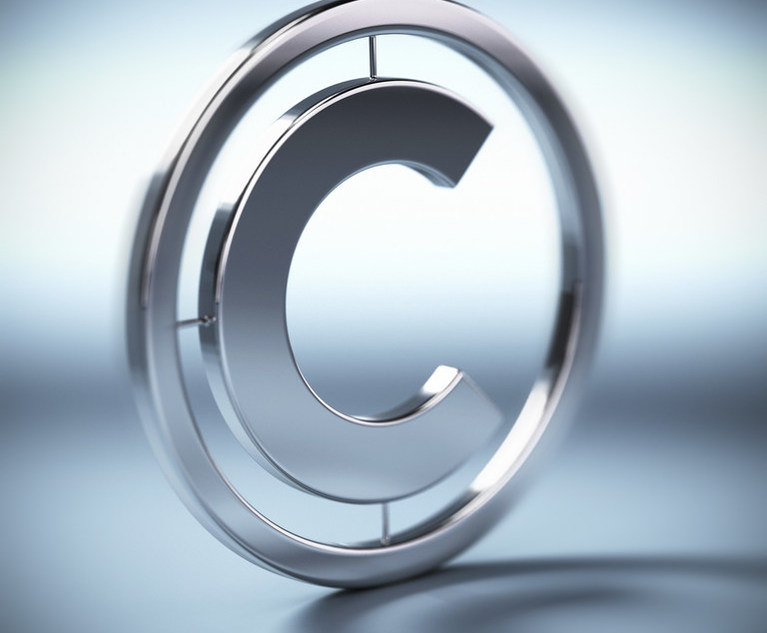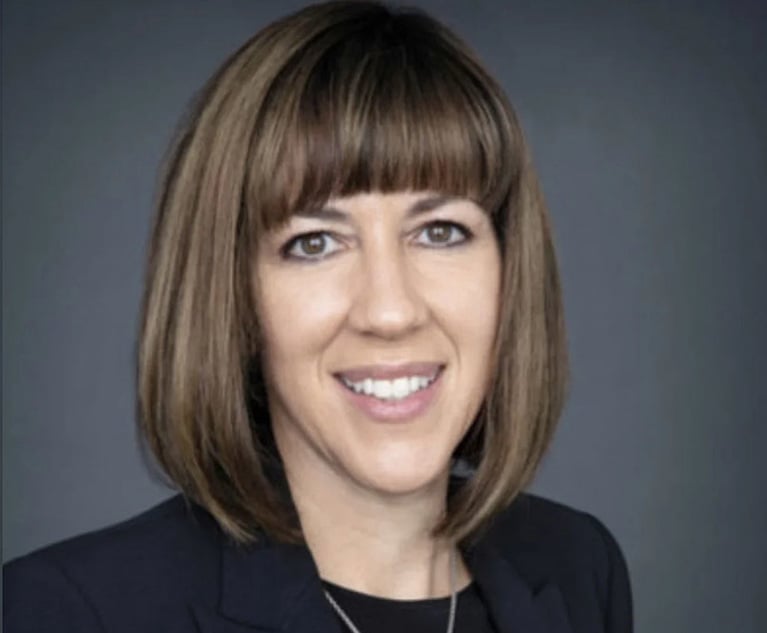How the Second Circuit's Decision in 'Horror v. Miller' May Haunt Production Companies for Years To Come
Like Jason's appearance at the end of 'Friday the 13th', the Second Circuit's recent decision in 'Horror Inc. v. Miller' invokes new life into the Copyright Act's termination provision.
October 18, 2021 at 11:15 AM
7 minute read
 Like Jason's appearance at the end of Friday the 13th, the Second Circuit's recent decision in Horror Inc. v. Miller, No. 18-3123-cv, 2021 U.S. App. LEXIS 29479 (2d Cir. Sept. 30, 2021) invokes new life into the Copyright Act's termination provision. 17 U.S.C.S. §203. Although the statute became effective on Jan. 1, 1978, the prospective nature of its terms meant that it did not have practical applicability until relatively recently. Under certain conditions, §203 of the Copyright Act provides that the author of a work "other than a work made for hire" may terminate the grant of a transfer or license under any copyright executed on or after Jan. 1, 1978, upon between two and 10 years of notice, during a five-year period, beginning 35 years after the execution or publication of the work, but no more than 40 years after execution thereof. Id.
Like Jason's appearance at the end of Friday the 13th, the Second Circuit's recent decision in Horror Inc. v. Miller, No. 18-3123-cv, 2021 U.S. App. LEXIS 29479 (2d Cir. Sept. 30, 2021) invokes new life into the Copyright Act's termination provision. 17 U.S.C.S. §203. Although the statute became effective on Jan. 1, 1978, the prospective nature of its terms meant that it did not have practical applicability until relatively recently. Under certain conditions, §203 of the Copyright Act provides that the author of a work "other than a work made for hire" may terminate the grant of a transfer or license under any copyright executed on or after Jan. 1, 1978, upon between two and 10 years of notice, during a five-year period, beginning 35 years after the execution or publication of the work, but no more than 40 years after execution thereof. Id.
For copyrights registered under the 1909 Copyright Act, which does not contain a definition of "work for hire," Circuit Courts of Appeals have generally applied the "instance and expense" test to determine if a work was a work for hire. See Marvel Characters v. Kirby, 726 F.3d 119, 137 (2d Cir. 2013) (explaining the history and application of the "instance and expense test."). Under the "instance and expense" test, courts created "a presumption of copyright ownership in the commissioning party at whose 'instance and expense' the work was done." Forward v. Thorogood, 985 F.2d 604, 606 (1st Cir. 1993), quoted in Markham Concepts v. Hasbro, No. 19-1927, 2021 U.S. App. LEXIS 17693, at *10 (1st Cir. June 14, 2021) (determining that Markham's work on "The Game of Life" was work for hire and depriving Markham of termination rights under 17 U.S.C.S. §203). This test generally leads to a finding that the copyright is owned by the corporate entity or hiring party. Courts continue to apply this test to works created prior to 1976 to determine whether the work was a work for hire. Markham Concept v. Hasbro, No. 19-1927, 2021 U.S. App. LEXIS 17693 (1st Cir. June 14, 2021).
Congress overhauled the Copyright Act in 1976 to provide that copyright ownership vests in the author of the work, except for "works made for hire." 17 U.S.C. §201(a) & §102. For "works made for hire," "the employer or other person for whom the work was prepared is considered the author" and owns the copyright, unless there is a written agreement that provides otherwise. 17 U.S.C. §201(b). Section 101 of the 1976 Act defines a work is "for hire" as being either (1) a work created by an employee within his/her scope of employment or (2) specifically commissioned work in discrete categories, as agreed by the parties in a written agreement to be a work for hire. 17 U.S.C. §§101; see Cmty. for Creative Non-Violence v. Reid, 490 U.S. 730, 737-38, 109 S. Ct. 2166, 2170 (1989).
This content has been archived. It is available through our partners, LexisNexis® and Bloomberg Law.
To view this content, please continue to their sites.
Not a Lexis Subscriber?
Subscribe Now
Not a Bloomberg Law Subscriber?
Subscribe Now
NOT FOR REPRINT
© 2025 ALM Global, LLC, All Rights Reserved. Request academic re-use from www.copyright.com. All other uses, submit a request to [email protected]. For more information visit Asset & Logo Licensing.
You Might Like
View All

'Serious Legal Errors'?: Rival League May Appeal Following Dismissal of Soccer Antitrust Case
6 minute read
'It's a Matter of Life and Death:' Ailing Harvey Weinstein Urges Judge to Move Up Retrial

Spotify GC Steps Down, Opts to 'Step Away From Full-Time Corporate Life'
2 minute readTrending Stories
- 1Trump Administration Faces Lawsuit Over USAID Stop-Work Orders
- 2Legaltech Rundown: Davis Wright Tremaine Announces CodeX Partnership, AAA Brings on Maya Markovich as VP, and More
- 3State Appellate Court Settles Fee Battle Between Former Co-Counsel in Patent Litigation
- 4Recent Controversial Decision and Insurance Law May Mitigate Exposure for Companies Subject to False Claims Act Lawsuits
- 5Visa Revocation and Removal: Can the New Administration Remove Foreign Nationals for Past Advocacy?
Who Got The Work
J. Brugh Lower of Gibbons has entered an appearance for industrial equipment supplier Devco Corporation in a pending trademark infringement lawsuit. The suit, accusing the defendant of selling knock-off Graco products, was filed Dec. 18 in New Jersey District Court by Rivkin Radler on behalf of Graco Inc. and Graco Minnesota. The case, assigned to U.S. District Judge Zahid N. Quraishi, is 3:24-cv-11294, Graco Inc. et al v. Devco Corporation.
Who Got The Work
Rebecca Maller-Stein and Kent A. Yalowitz of Arnold & Porter Kaye Scholer have entered their appearances for Hanaco Venture Capital and its executives, Lior Prosor and David Frankel, in a pending securities lawsuit. The action, filed on Dec. 24 in New York Southern District Court by Zell, Aron & Co. on behalf of Goldeneye Advisors, accuses the defendants of negligently and fraudulently managing the plaintiff's $1 million investment. The case, assigned to U.S. District Judge Vernon S. Broderick, is 1:24-cv-09918, Goldeneye Advisors, LLC v. Hanaco Venture Capital, Ltd. et al.
Who Got The Work
Attorneys from A&O Shearman has stepped in as defense counsel for Toronto-Dominion Bank and other defendants in a pending securities class action. The suit, filed Dec. 11 in New York Southern District Court by Bleichmar Fonti & Auld, accuses the defendants of concealing the bank's 'pervasive' deficiencies in regards to its compliance with the Bank Secrecy Act and the quality of its anti-money laundering controls. The case, assigned to U.S. District Judge Arun Subramanian, is 1:24-cv-09445, Gonzalez v. The Toronto-Dominion Bank et al.
Who Got The Work
Crown Castle International, a Pennsylvania company providing shared communications infrastructure, has turned to Luke D. Wolf of Gordon Rees Scully Mansukhani to fend off a pending breach-of-contract lawsuit. The court action, filed Nov. 25 in Michigan Eastern District Court by Hooper Hathaway PC on behalf of The Town Residences LLC, accuses Crown Castle of failing to transfer approximately $30,000 in utility payments from T-Mobile in breach of a roof-top lease and assignment agreement. The case, assigned to U.S. District Judge Susan K. Declercq, is 2:24-cv-13131, The Town Residences LLC v. T-Mobile US, Inc. et al.
Who Got The Work
Wilfred P. Coronato and Daniel M. Schwartz of McCarter & English have stepped in as defense counsel to Electrolux Home Products Inc. in a pending product liability lawsuit. The court action, filed Nov. 26 in New York Eastern District Court by Poulos Lopiccolo PC and Nagel Rice LLP on behalf of David Stern, alleges that the defendant's refrigerators’ drawers and shelving repeatedly break and fall apart within months after purchase. The case, assigned to U.S. District Judge Joan M. Azrack, is 2:24-cv-08204, Stern v. Electrolux Home Products, Inc.
Featured Firms
Law Offices of Gary Martin Hays & Associates, P.C.
(470) 294-1674
Law Offices of Mark E. Salomone
(857) 444-6468
Smith & Hassler
(713) 739-1250






